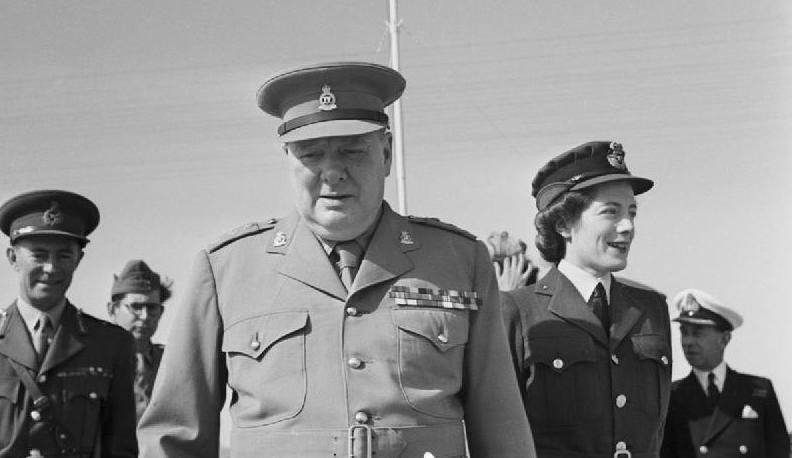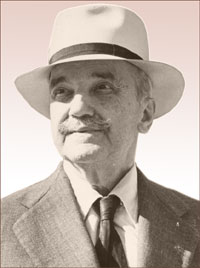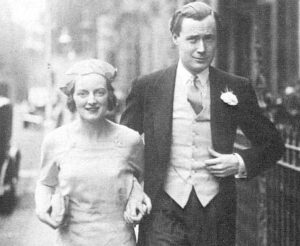
Churchill Quips: God, Santayana, Musso & Not Getting Scuppered
Coming up: Churchill: Master of Language
In preparation for Sir Winston’s 150th birthday is my 800-page book, Churchill: Master of Language: The Encyclopedia of His Greatest Words. The publisher is Hillsdale College Press, with an e-book by Rosetta and a leatherbound limited edition by Easton Press.
The fifth and final edition of Churchill by Himself, aka Churchill in His Own Words, adds 1500 new quotations for a total over 5000. Its thirty-four chapters and seven appendices contain half a million words—the most memorable or amusing Churchill said. Included is an exhaustive index to key phrases, people, places and events. Watch this site for further news.
Updated from 2012, here is a quartet of frequently asked questions about what Churchill said (or didn’t say). Two are genuine and in the book. Two are in my “Red Herrings” appendix of words Churchill never uttered.
“If God wearied of mankind”
From Churchill’s last major speech in Parliament comes a quotation devoid of his usual optimism. For some reason I can’t possibly imagine, this often comes up with regard to current global affairs:
Which way shall we turn to save our lives and the future of the world? It does not matter so much to old people; they are going soon anyway; but I find it poignant to look at youth in all its activity and ardour and, most of all, to watch little children playing their merry games, and wonder what would lie before them if God wearied of mankind. —House of Commons, 1 March 1955
“Not being scuppered”
If we could avoid getting scuppered by God, Churchill hoped we might also avoid it in politics.
A reader writes: “Can you confirm that Churchill said this? He became prime minister again in October 1951. A month later he supposedly announced three priorities to his private secretary, Jock Colville. Allegedly he said: ‘houses, red meat and not getting scuppered.’ But I can’t find it in Colville’s Fringes of Power.”
It was quoted as you state it by the late Paul Addison in his outstanding book Churchill on the Home Front (1992) 412, footnoted to Fringes of Power, the Colville diary, 22-23 March 1952. But Paul had the verb wrong.
What Churchill said was “not being scuppered.” As such it appears in Fringes of Power (Hodder & Stoughton first U.S. edition. 1985), 644. Martin Gilbert also has it in Never Despair, volume 8 of the Official Biography (Hillsdale College Press, 2013), 717.

The past: condemned to repeat it
A librarian asked about the famous quote by George Santayana (in The Life of Reason, 1905): “Those who cannot remember the past are condemned to repeat it.” She knew the quote was originally Santayana’s, but wished to know if Churchill said it. And if so, when?
I searched the Hillsdale College Churchill Project database: 80 million published words by and about WSC. This includes his own 20 million (books, articles, speeches, letters, private papers). Alas I could find no occurrence of Santayana in anything Churchill said. I could not even find key phrases (“remember the past”…”condemned to repeat it”). So Churchill never repeated Santayana’s phrase in so many words, though he certainly shared the sentiment.
Churchill worried also that knowledge of the past would mean “the most thoughtless of ages. Every day headlines and short views” (House of Commons, 16 November 1948). But perhaps his best remark on the subject was this:
When the situation was manageable it was neglected, and now that it is thoroughly out of hand we apply too late the remedies which then might have effected a cure. There is nothing new in the story. It is as old as the Sibylline Books. It falls into that long, dismal catalogue of the fruitlessness of experience and the confirmed unteachability of mankind.
Want of foresight, unwillingness to act when action would be simple and effective, lack of clear thinking, confusion of counsel until the emergency comes, until self-preservation strikes its jarring gong—these are the features which constitute the endless repetition of history. —House of Commons, 2 May 1935, after the Stresa Conference, in which Britain, France and Italy agreed—futilely—to maintain the independence of Austria.

Shooting his son-in-law
A reader asks if Churchill ever admired Mussolini. This doesn’t refer to the bouquets he threw Il Duce in 1927, when he persuaded Musso to repay the Italian war debt. It supposedly occurred in a conversation involving Churchill’s son-in-law, Duncan Sandys, who married his daughter Diana.
The story goes that toward the end of the Second World War, Sandys told Churchill that “Hitler and Mussolini have an even greater burden to bear, because everything is going wrong for them.” Supposedly Churchill replied: Ah, but Mussolini has this consolation, that he could shoot his son-in-law!
I will not dignify that with quotation marks because it is nothing Churchill said. It refers to the execution by firing squad of Count Galeazzo Ciano (1903-1944). The non-quote originated in newspaper proprietor Cecil King’s war memoir, With Malice Toward None (1970)—a diary note for 20 July 1944. But King added that it was “obviously concocted by some wag.” No other source states that Churchill made any such statement.
In fact Churchill quite liked Duncan Sandys and appointed him to important government ministries. More believable is that Churchill said this about a son-in-law he thoroughly disliked: Vic Oliver, née von Samek, an Austrian-born music hall comedian who married Sarah Churchill in 1936. Supposedly Oliver asked WSC if he admired any enemies, and Churchill named Mussolini for being able to shoot his son-in-law. It is all rubbish.
What Churchill said
Winston Churchill’s first worry was for his daughter. If war came, he told Sarah, “you will be married to the enemy.” —Sarah Churchill, A Thread in the Tapestry (1965), 52.
To his wife, WSC declared Oliver “as common as dirt. An Austrian citizen, a resident in U.S., and here on license and an American passport: twice divorced: thirty-six so he says. A horrible mouth: a foul Austro-Yankee drawl. I did not offer to shake hands.” —Martin Gilbert, ed., The Churchill Documents, vol. 10 (2008), 53.
True, Churchill called Mussolini every name in his book: ”whipped jackal”…”organ grinder’s monkey”…”absurd imposter.” But while Churchill mentioned Ciano’s execution, he did not say say he approved:
[T]he successful campaign in Sicily brought about the fall of Mussolini and the heartfelt repudiation by the Italian people of the Fascist creed. Mussolini indeed escaped, to eat the bread of affliction at Hitler’s table, to shoot his son-in-law, and help the Germans wreak vengeance upon the Italian masses whom he had professed to love. and over whom he had ruled for more than twenty years. —Broadcast, London, 26 March 1944
Italian partisans caught up with Mussolini in 1945, the same year Sarah and Vic divorced. Churchill had warmed slightly toward Oliver by then, though Vic had the infuriating habit of calling him “Popsie.” Churchill was upset over the breakup, mainly thinking about Sarah.
Desert Island Discs
For trivia fans, Vic Oliver was the very first guest on the long-running BBC programme, “Desert Island Discs” in 1942. See Alex Hudson, “The Castaway Who Annoyed Churchill,” BBC News Magazine, 26 January 2012.
Related reading
“All the Quotes Winston Churchill Never Said,” Part 1 of 4 parts, 2018.
“Paul Addison 1943-2020: What Matters is the Truth,” 2020
“‘Greatest Law-Giver’: The Truth Behind Churchill’s Mussollini Bouquets,” 2022
“Myths of Dear Benito: Churchill’s Alleged Mussolini Complex,” 2024.
“Fascists of the Future Will Call Themselves Anti-Fascissts,” 2020.






